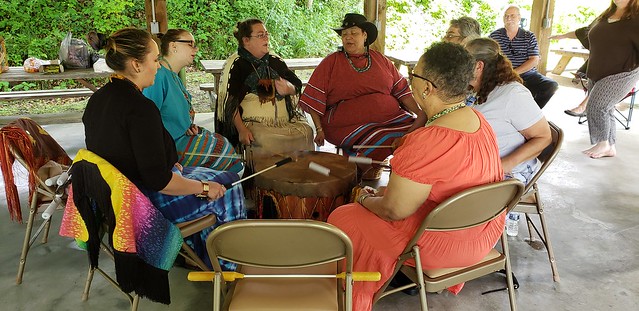
“In the western tribes, once you saw the water spider, the stories ended. You needed to get out and work. But that’s not my tradition. What you don’t use, you lose,” said Elle High, former Native American Studies Professor and Program Coordinator at West Virginia University, as she helped tell the story of the early roots of West Virginia Methodists in Union, WV.
High, who serves as chair of the WVUMC Committee on Native American Ministries (CONAM), was speaking at a service June 1 at Old Rehoboth Church United Methodist Heritage Landmark, the oldest protestant church west of the Allegheny Mountains.
“Rehoboth,” a Hebrew word meaning “broad places,” was the name given to the well dug by Isaac in Genesis 26. It was also the name given to the newly built church in Union (then part of Virginia) in 1787. Only four years separated from England, the Methodist Church had begun to spread throughout the East Coast and was now expanding across the Alleghenies.
But for these new Methodists, there was a problem. Worshipers who had gathered in nearby cabins began to outgrow them, and native peoples surrounding the new church threatened its security. Laymen carried Bibles and shotguns on their way to claim their split-log pews, and they constructed the church in an earthen bowl—a technique known as reverse-slope defense—in an effort to protect attendees.
There are more Native American members in our denomination than in any other. The 2012 UMC General Conference and WV Annual Conference 2016 calls for Native American reconciliation brought about Saturday’s act of repentance and worship featuring the Mother Earth Beat Drum.
The all-female drum, representing the Cherokee, Blackfoot, Shawnee, and other tribes, gathered less than 100 yards from the old church building where they prayed and performed music. High, Rev. Ken Krimmel, and Old Rehoboth caretaker Anita Tracy led prayers, gave a formal tour of the site, and presented CONAM’s efforts while debunking myths on Native American presence in West Virginia. Apologies were made and relationships were restored through word, song, dance, and a “smudging ceremony” with a sage cleansing.
As the Red Cedar Buffalo Drum (“healing drum”) pounded, sage smoke rolled down the hill and through the doors of the log church. Melissa Smith, drumkeeper and lead singer, celebrated this time of remembrance. “We love working for and with CONAM. They have sponsored us many times over the years. We are extremely grateful for how they’ve supported our drum. We’re happy to work with them,” she said.
With open minds, open hearts, and open doors, Native Americans walked in peace through the doors of the old log church. In memory of this event, a white pine sapling was planted (you may recall the trees presented at Annual Conference 2016 as part of our repentance and reconciliation service). As we continue our story, let us pray and work actively towards promoting stronger relationships with Native Americans in and throughout our conference.
Click here to view photos and videos from the June 1, 2019 event at Old Rehoboth on our Flickr page